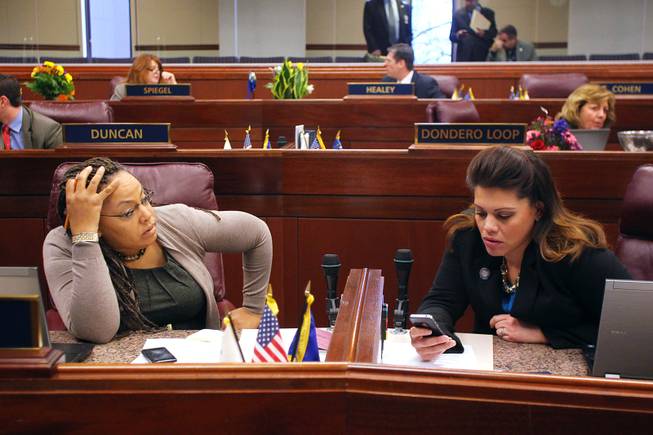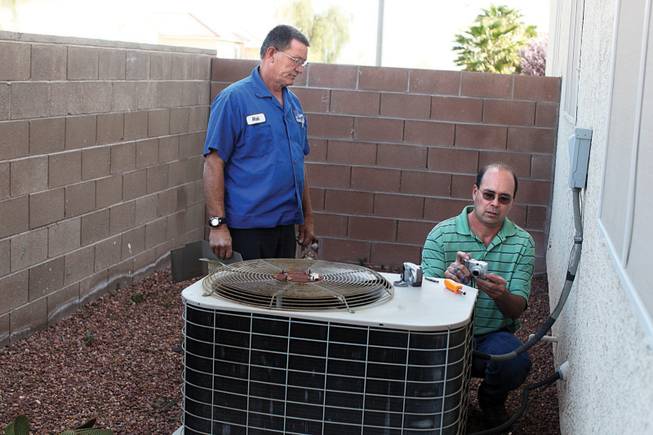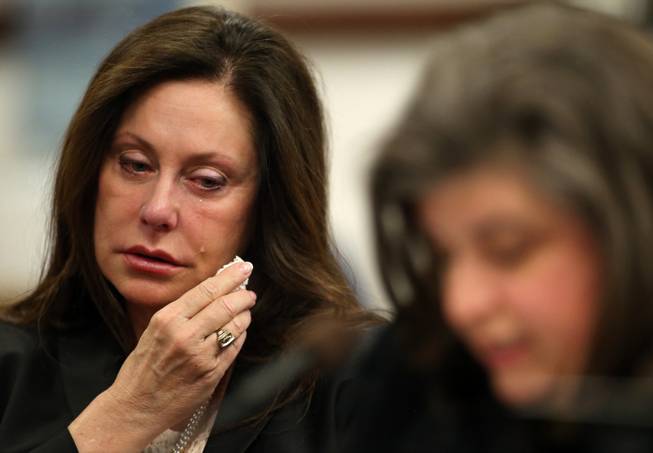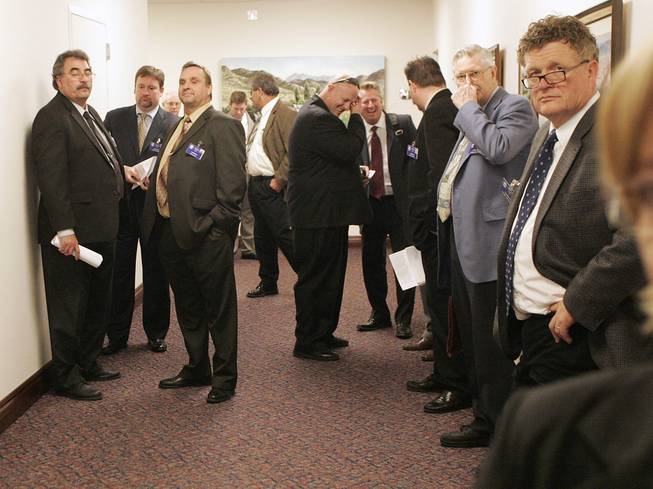
Sam Morris / Las Vegas Sun
Assemblywomen Dina Neal, left, and Teresa Benitez-Thompson talks before an Assembly meeting on the third day of the 2013 legislative session Wednesday, Feb. 6, 2013 in Carson City.
Wednesday, April 24, 2013 | 2 a.m.
Sun coverage
Tuesday was a big day for scores of bills in the Nevada Legislature — a day when measures died or traveled to the opposite house, where they may encounter more hostile territory for their second round of hearings.
Democrats have the majority in both the Senate and the Assembly, meaning partisan differences won’t necessarily be at play when determining the fate of legislation in the second house.
But sometimes intra-party differences can be more vitriolic than inter-party divisions and personality politics are never completely removed from the equation.
Of course, death or transfer to the second house weren’t necessarily the only two fates to befall the bills, despite Tuesday’s official “first house passage” deadline. Some measures also were plopped into the money committees, where they’ll likely sit until the legislative grand bargain that comes at the tail end of session is brokered.
Here’s a look at where key pieces of legislation stand following Tuesday’s deadline:
-

Construction defects legislation alive in one house, dead in the other
In the Senate, where the Judiciary Committee is chaired by one of the most liberal lawmakers in the Legislature, a Republican bill to reform the law governing how homeowners can sue for faulty construction died a quick death.
Senate Bill 161 never made it out of committee.
In the Assembly, however, an almost identical bill — Assembly Bill 184 — that redefines what constitutes a defect and limits the attorneys' fees passed out of committee. Briefly, the measure made it to the floor.
No floor vote occurred, however. An appropriation for a study was amended into the bill, meaning it was sent to Ways and Means.
Legislative leaders said the bill was kept alive so it could be part of the session’s endgame — when Republicans bargain policy bills for votes on tax increases.
-

Fate of Lake Tahoe’s environmental oversight heads to the Assembly
In a party-line vote, the Senate passed Senate Bill 229, which would repeal a 2-year-old law that could force Nevada to withdraw from its compact with California to protect Lake Tahoe.
The narrow vote — it passed on a one-vote margin — was proof of the heavy lobbying effort employed by a coalition of business interests at Lake Tahoe who want to see the bi-state compact amended to ease development restrictions.
That lobbying effort will surely travel across the legislative hall to the Assembly. Last session, the law to withdraw from the compact split the Democratic caucus in the Assembly.
One Democratic lawmaker, however, anticipates SB229 will find a friendly reception this year.
But the party-line vote in the Senate — in which every Republican voted against the measure — is a reflection of Gov. Brian Sandoval’s position on the issue. And Democrats don’t have the necessary two-thirds majority to override a veto.
-

Marriage equality measure likely to find friends in the Assembly
Following the most riveting floor debate so far this session, the Nevada Senate passed a measure to begin the process of repealing Nevada’s constitutional gay marriage ban.
Lawmakers from both parties sought to balance religious convictions with their public policy stance. Republicans largely decided to oppose the measure, chiefly because it included a provision that would require the state to recognize same-gender marriages.
If Senate Joint Resolution 13 passes this session, it would have to be passed again by the 2015 Legislature before being placed on the 2016 ballot for voters to decide.
Only one Republican senator joined Democrats to pass the measure in the Senate.
But in an indication of how Senate Joint Resolution 13 would fare in the Assembly, many lawmakers in the opposite house tweeted congratulations and messages of support to the senators who backed it.
Also, Speaker Marilyn Kirkpatrick, D-North Las Vegas, who has significant sway over the policy that comes out of her house, is on record saying Nevada voters should be able to decide both a repeal of the ban and a provision recognizing gay marriage.
-

Bill on arrestee DNA collection difficult issue for Democrats
Two years ago, a single lawmaker, Sen. Steven Horsford, killed a hard-fought bill that would have allowed Nevada law enforcement to collect DNA from those they arrest prior to a conviction.
Horsford believed the measure could impinge on civil rights and could disproportionately affect minorities. That concern lingered this session among legislators.
But after an amendment by Sen. Aaron Ford addressed many of those issues, the Senate unanimously passed Senate Bill 243 — named Brianna’s law after a young Reno woman, Brianna Denison, who was raped and murdered in 2008.
Some key Democrats in the Assembly, however, said they wanted to review the amendment to ensure their concerns had been adequately addressed, and that law enforcement agencies would have the necessary funding to implement the new collection procedures.
“It’s a serious issue, with a compelling story behind it,” said Assemblyman Jason Frierson, who chairs the Assembly Judiciary committee that will process the measure. “I’ve met with victims' families many times.”
Frierson added he needed to “review the amendment” to ensure his concerns had been addressed.
-

Bill to close lawmaker-lobbyist revolving door heads to skeptical Senate committee
A bill that would require former legislators to wait before returning to the Legislature as a lobbyist passed the Assembly on a 40-1 vote.
The so-called “cooling-off” period requires a legislator to wait for one legislative session before returning to the Legislature as a lobbyist. It’s Assembly Minority Leader Pat Hickey’s way to cut down on the practice of legislators immediately becoming lobbyists after they lose an election or decide not to run for office again. In political parlance, it’s called the “revolving door.”
The bill, Assembly Bill 77, was amended twice, giving legislators some instances in which they could lobby during the prohibited period.
It now awaits passage in the Senate Legislative Operations and Elections committee, where it may encounter some opposition from members who have voiced concerns about disclosure requirements and other reforms that could be viewed as restrictions on legislators.
-

Comprehensive sex education heads out of Assembly on party-line vote
A controversial sex education bill from Assemblyman David Bobzien, D-Reno, passed out of the Assembly on a 26-15 party-line vote.
The bill would delineate further requirements for school districts’ sex education policies.
“The current sex ed law was passed over 30 years ago,” Bobzien said. “It is outdated and inadequate to our students today.”
The bill has garnered national attention and has tied together a number of hot-button words — sex, children, schools, Planned Parenthood, abortion, abstinence — that have sparked criticism and concern.
Its supporters call it a common-sense update to the state’s sex education policy and a safeguard for teen health.
Its opponents say the bill takes away local control and pushes the agenda of the reproductive health advocacy group Planned Parenthood.
Under the measure, parents still would be able to opt out of sex ed classes for their children..
The bill now heads to the Senate, where strong education supporters such as Sens. Debbie Smith, D-Sparks, and Joyce Woodhouse, D-Las Vegas, will likely work to shepherd the bill’s passage in the Senate. It already has four sponsors.
-

Sales tax hike for police goes to the Senate with few detractors
The Assembly moved forward a sales tax increase for police departments in Clark County. The proposal would raise the 8.1 percent sales tax rate in Clark County to 8.25 percent.
The 32-9 vote kicks Assembly Bill 496 to the Senate.
The measure requires a two-thirds vote of the Clark County Commission to enact the tax.
Gov. Brian Sandoval has said he would sign the measure, noting that voters have previously approved the sales tax increase.
Given that the Clark County Commission has to vote to actually increase the tax, state lawmakers don’t have to take a politically risky vote on a tax increase.
The Las Vegas Metropolitan Police Department is facing a funding shortfall in its upcoming budget, which it says will mean hundreds fewer officers on the streets.
“Our police force is being depleted in Southern Nevada,” said Assemblyman Lynn Stewart, R-Henderson. “Our neighborhoods need protection. Our tourists on the Strip need protection.”








Join the Discussion:
Check this out for a full explanation of our conversion to the LiveFyre commenting system and instructions on how to sign up for an account.
Full comments policy